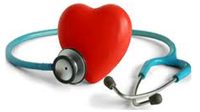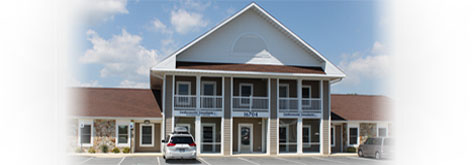Nuclear Stress Test
WHAT IS IT?
Stress testing provides your doctor with information about how your heart works during physical stress. Some heart problems are easier to diagnose when your heart is working hard and beating fast. During a stress test, you exercise (walk or run on a treadmill) or are given a medicine to make your heart work harder while heart tests are performed.
Basic Facts
A stress test helps show whether enough blood flows to your heart when it's working hard. Doctors usually use stress testing to help them diagnose coronary artery disease (CAD) or to see how serious this disease is in those who are known to have it.
During a stress test, your heart is monitored using electrodes attached to your chest. This will allow your doctor to see your cardiac rhythm.
Standard exercise stress tests use EKGs (electrocardiograms) and breathing and blood pressure monitoring to assess blood flow in the heart. Imaging stress tests, such as those that use radioactive dyes show how well blood is flowing in heart muscle. Imaging stress tests tend to be more accurate than standard exercise tests.
You may need a stress test if you have CAD symptoms, such as chest pain and shortness of breath. If you've been diagnosed with CAD or recently had a heart attack, you may have stress testing to see whether treatments aimed at improving blood flow in the heart's arteries are needed and likely to help you. Stress testing also is done on people who have signs of an arrhythmia (irregular heartbeat).
Stress testing may be done at a doctor's office or at a hospital. It will usually take between 1 and 4 hours.
You may have to restrict your diet or not take certain medicines before a stress test. Be sure to wear shoes in which you can exercise comfortably during the stress test.
Your health status will always be closely monitored during a stress test, and you will not have to exercise more than you think you can handle. Stress tests are safe and have few side effects. The chance of a stress test causing a heart attack or death is only about 1 in 5,000.
You're able to return to all your normal activities after a stress test.
If test results are normal, no further testing or treatment is usually needed unless your CAD symptoms persist. If there are abnormal results on your standard exercise stress test, your doctor will probably want you to have an imaging stress test or undergo other testing. But imaging may not be needed if factors other than CAD could explain the abnormal results. Abnormal results on an imaging stress test will require more testing and/or treatment.
Stress Nuclear Study
What is a stress nuclear test?
A cardiac (heart) nuclear study is a test that uses a small dose of radioactive solution to track blood flow to the heart muscle, and to evaluate heart function.
A treadmill stress test evaluates your heart's response to physical activity through the monitoring of your heart rate, blood pressure, and electrocardiograms while you exercise on a treadmill.
When the two tests are combined, an assessment can be made of the status of the blood supply to your heart at rest, as well as during stress. This can provide your doctor with information regarding whether or not you have significant blockages in your heart arteries. The test also includes an assessment of the pumping function of your heart.
Common reasons to have this test:
To determine if coronary artery disease is present and if further studies and/or treatment are required.
To evaluate progress following a major cardiac event (heart attack, heart surgery).
To evaluate whether a blockage found during an angiogram requires angioplasty.
To follow the progress of documented coronary artery disease.
Preparing for the test:
DO NOT consume any caffeinated or decaffeinated beverages (coffee, tea, pop/soda), chocolate, or products containing caffeine for 24 hours before the test.
DO NOT eat, drink or smoke for 3 hours before the test. Small amounts of water are allowed.
DO NOT use body oils or body lotions the day of the test.
Do take your usual medications with water, unless instructed otherwise by your doctor or nurse.
Diabetics who use insulin or glucose lowering agents may need to adjust their dosage. Please check with your physician if you are not sure.
Wear loose fitting clothing that allows easy access to the chest, and comfortable walking shoes.
The test:
The entire test will take approximately 3 1/2 to 4 hours, although you will be walking on the treadmill for approximately 10 minutes of that time.
An IV will be started in your arm and a small dose of radioactive solution will be injected. After this injection, you will be asked to wait approximately 45 minutes – 1 hour to allow this material to be taken up by your heart cells.
After the 45 minute- 1 hour wait time you will lie on a scanning table and a special camera (gamma camera) will be positioned close to your chest, and you will be asked to lie still. The gamma camera takes pictures of your heart. This part of the test takes approximately 15-20 minutes.
After the image session electrodes will be placed on your chest and wires will be attached to the electrodes so that the electrocardiogram (ECG) can be monitored continuously during the test. In men, limited shaving of the chest may be required to assure good contact between the skin and the electrodes. A blood pressure cuff will be placed on your arm so that your blood pressure can be measured before, during, and after exercise.
You will then walk on a treadmill machine, which is an electrical walkway that can be raised. The speed and incline will increase gradually, such that you will be walking uphill. Your blood pressure will be checked intermittently and from time to time you will be asked if you are experiencing any symptoms. You will be encouraged to exercise for as long as you can. If you notice chest pain, dizziness, weakness, lightheadedness, or leg fatigue, inform the nurse. Near the end of the stress test, you will receive another injection of a radioactive solution so that blood flow to your heart during stress can be assessed. After stopping exercise, you will continue to be monitored until your heart rate and blood pressure return to pre-exercise levels.
Finally, you will lie back down on the scanning table to be imaged by the gamma camera for another 20 minutes.
Is it safe?
Stress testing is very safe. The likelihood of a serious complication (such as a heart attack or death) is less than 1 in 10,000. It is important to keep in mind that you will be continuously and extensively monitored throughout the test by experienced personnel and that the test will be stopped if there is any indication that continuing exercise would be unsafe in any way.
There are no reports of allergic reactions or side effects related to injection of the radioactive solutions. The radiation exposure from the test is very small (equivalent to that of several chest x-rays) and not associated with any significant health risk.
When will I receive my test results?
Your test will be reviewed and interpreted by a cardiologist.




